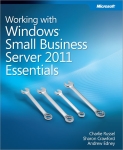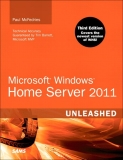By Philip Churchill on December 15th, 2007
Speed Up Windows Home Server File Copies?
Steven Kerr Lindsay has written an article on how to speed up your WHS file copies and his top tips for fast file copy are:
- Ensure your primary hard disk on your WHS is at least the speed of the fastest disk on your network.
- Ensure your primary hard disk on your WHS is at least the size of the largest hard disk in your WHS storage.
- Use a disk de-fragmentation tool on your Storage drives (You need de-fragmentation tools specific to Home Server, such as Raxco Perfect Disk for Home Server or Diskeeper 2008 Home Server).
- Unless you need duplication on a folder, turn it off. Duplication in intended for files you really want to ensure you don’t loose. i.e. Photos, Personal documents etc.
- Unless you need and use the Media Streaming feature of WHS leave it turned off.
- Get a 1 Gigabit switch for your network and a 1 Gigabit network card for your WHS, attach your WHS and machines which talk to the WHS to the switch. At the very least your WHS will benefit from being connected to a 1 Gigabit switch even if your other PC’s are not using 1 Gigabit network cards. This is due to your WHS being capable of sending more data to more PC’s at once when using 1 Gigabit even if the other PC’s themselves are only using 100megabit network cards.
- Get 1 Gigabit network cards for your PC’s which talk to the WHS if you can. As above at the very least get your WHS a 1 Gigabit network card. This tip is obviously contingent on you having a 1 Gigabit switch. Also ensure the cards are actually configured 1 Gigabit, otherwise it would defeat the purpose.
- Don’t expect to get the full 1 Gigabit speeds on your Home Server or any machine on your network. 1 Gigabit networks do not run 1 Gigabit in homes, they typically run at the fastest at around 300Mbits/s, and typically around 100-200Mbits/s. This is just how 1 Gigabit works in home environments. I included an article below which you can read which will explain some of the issues with speed on 1 Gigabit home networks.
- If you are using custom plug-ins on your Windows Home Server be aware of what they are doing, you don’t want to slow down the WHS as this could end up slowing down everything on the WHS including file copies.
- Fully understand how Windows Home Server Drive Extender works by reading Microsoft’s white paper.
The full article including links to the programs and white paper mentioned above is available here.
Share this WHS Article with Others:




Hi Alan,
Thanks for your comment. I am using Vista on my client PCs and since installing the RC1 of SP1 for Vista my transfer speeds have tripled. Something worth looking into if you are using a Vista machine.
Point 3 (use a defrag utility) and Point 10 (read MS’s WHSDE white paper) conflict with each other. MS is pretty clear about not using defrag utilities. Or did I miss something?
As a typical home wife, with five “digital” teenagers at home, we bought the HP (HP EX475) WHS a month ago.
First, relating to this above topic, about WHS transfer speeds, can anyone at all explain to us why connecting an external USB hard drive MUST be first formatted when using WHS?
My teenagers typically share files with their friends, relatives and family members, but our WHS is already full (1TB) and so they wanted to just connect their USB or eSATA external hard drives to the server, but this isn’t allowed unless you first FORMAT everything in order to use.
That means everyone has been connecting our external hard drives to our PC’s and then transfering all these files to the WHS, after making room by deleting older transfered files. Our typical transfer speed is even slower than any of our USB hard drives. Meaning, if you just copy a file say 800MB to a PC, it takes less than 2.6 seconds on average… but if you transfer files (movies and photos) to the WHS, it takes about 2 hours 13 minutes here. So you can image having to transfer 300GB/1TB (remmember 5 teenagers plus husband and wife and relatives) plus files…
Our teenagers call our HP WHS a “Turtle”! Rather than expecting WHS to be a server, for us, it’s our PC’s serving WHS!
And as for Philip’s comment, triple speed? You mean you were only experiencing slower speed (???), but now it’s (still slower than your average USB 2.0 or eSATA), right?
By the way both methods of tranferring files to the WHS be RJ-45 (1Gbit router) or 802.11.n allow PC to PC to be many times faster… Our best is at 300MBps, and the worse (laptop) was around 33MBps sustained. WHS wasn’t even that… but around 128 Kilobytes!
Why cannot WHS allow external hard drives to simply connect and share without first reformatting?
Shouldn’t WHS be plug and play ready to serve?
Hi mikehd,
The defrag utility that the Windows Home Server Drive Extender white paper talks about is the one built into Server 2003/WHS. Defrag tools that are specifically built for WHS are OK.
The WHS/2003 Defrag method sucks, as it doesn’t take advantage of file placement for speeding up access to most common files, nor does it apply intelligence to the most common files used, and so on.
It’s also very S-L-O-W too… and if you buy third party solution like Disk Keeper, it actually slows down your WHS by monitoring all the time running in the background. Perfect Disk does a much better job! No annoying CPU and memory hogging, and it actually places your most used files on faster hard drive areas to access faster your data/files.
This only proves that the method of having Microsoft monopolize their source code, denies other individuals to IMPROVE upon the application. Consider how Windows has been around for a long time and it’s still using the same old defrag application….
That’s why open source (GPLv3) is better for society, as everyone can benefit and contribute to the overall success.
in my case i see 100% cpu load and small or no network traffic during times of the backup. Is my P3-866 bottleneck?
Does jumbo frames make a difference?